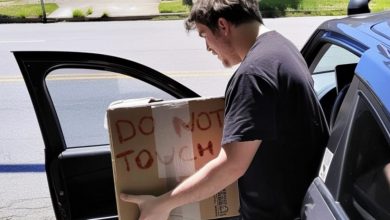My pregnant sister-in-law turned me into her maid—I went along until she finally went too far

I spent weeks playing the perfect role: the quiet servant to my pregnant sister-in-law. I said nothing when she ordered elaborate meals at odd hours. I nodded when she complained that her swollen ankles ached. I tipped my head and took her plates away without ever asking a question. But the moment my own brother told me I was worthless for not having my own children, I decided enough was enough. That was when I stopped playing the victim. That was when I started making plans to free myself.
My name is Liz. I’m thirty-five years old, and until six months ago, I was married to a good man named Tom. He was kind, thoughtful, and always ready with a joke to lift my spirits. On lazy Sunday mornings, he brought me coffee in bed, carefully balancing the cup on a small tray. We shared a cozy house, complete with a white picket fence and dreams of the laughter of little children filling our rooms. We imagined designing bright nursery walls and tiptoeing across the floor at midnight to soothe a crying baby.
But life rarely unfolds exactly as we plan.
For four years, we tried to have a baby. Four years filled with hope, tears, and constant doctor appointments. Every month felt like a roller coaster: exhilaration as I remembered my cycle dates and pain as the test told me again that I was still not pregnant. We invested in fertility treatments that cost more than our car. We emptied our savings to travel across the state, seeing specialists who all gave us the same heartbreaking news: nothing was happening. I tracked my basal body temperature every morning at dawn. I counted days with obsessive precision. I drank only the healthiest smoothies loaded with vitamins. I changed my diet so drastically that I barely recognized the person staring back at me in the mirror.
Despite all that, my body betrayed me. And every time a friend or neighbor chirped, “So, when are you two going to have kids?” I felt my face burn with shame. I wanted to vanish into thin air.
At first, Tom was supportive. He held me when I cried on the bathroom floor. He whispered that we’d face it together. He said all the right words.
They only carried me so far.
One Tuesday morning, not long ago, he skimmed the newspaper at the kitchen counter and dropped the words I had always dreaded.
“I can’t wait any longer,” he said, not looking at me.
Just like that, it felt like I was an old story he was ready to throw out.
“What do you mean?” I managed, though my voice trembled with fear. I had seen the signs: the way he hid his phone screen, the way he jumped when I came close.
“I want kids, Liz. Real kids. Not just the idea of them.” His tone was flat, as if he were finishing an errand.
I whispered, “We could look into adoption…”
For the first time that morning, he looked at me. I saw something in his eyes crack—like a piece of me broke there.
“I want a child with my own blood,” he said quietly. “I can’t spend my life waiting for a miracle.”
Six weeks later, he was gone. He moved out, set up house with his new partner—his secretary—who was already three months along.
Gone was everything I thought we would build.
Broken-hearted and stunned, I went home to the only people who seemed to love me unconditionally: my parents. They welcomed me with warm hugs and tears. My mother made meatloaf and watched me eat it in silence. My father fixed the lock on my old bedroom door, giving me space to cry without interruption. In their embrace, I felt safe—or at least, safer than I had in months.
But that feeling didn’t last long.
My brother Ryan and his wife Madison announced they needed a place to stay. They were renovating a house across town and said it would only be for a few weeks. Madison was six months pregnant. She flashed that sweet, demure smile that always meant she wanted something. My parents, eager to host a future grandchild, offered them the guest room without hesitation.
At first, I thought maybe this would be okay. Ryan helped Dad in the yard. Madison stayed mostly in the living room, napping and reading. She complained about dizziness, and sometimes I would bring her a cold compress or a glass of juice.
But soon, small requests turned into demands.
One morning, she strolled into the kitchen while I was finishing my toast.
“I’m craving chocolate pancakes with crispy bacon,” she announced, gesturing at the empty counter. “And I want hot syrup on the side—like, in a separate dish. Got it?”
“Um…” I hesitated.
She rolled her eyes. “You live here too, right? Help me out.”
So I made stacks of fluffy chocolate pancakes and lined crispy strips of bacon beside them. I poured the syrup into a small bowl, exactly as she asked. She ate half a pancake and declared it too sweet. Then she picked off the bacon and said it was not crunchy enough.
I said nothing.
Every day her list grew longer. Homemade chicken pot pie with peas removed. Thai noodles with no peanuts. Casseroles baked in a dish I didn’t own. She critiqued every bite.
Then came the chores. One afternoon, she tapped her painted nails.
“Could you vacuum my room?” she asked sweetly. “My ankles are like balloons.” She pointed at the guest room. “And those mirrors are filthy. They have water spots. I can’t look at a spot!”
I walked whispers through the house, vacuuming and wiping until my arms ached.
Mom and Dad cheered each little wobble of Madison’s belly. They talked about cradles and pastel wall paint. They never saw me scrub the baseboards or ferry trays of food to the guest room. And Ryan? He sat quietly scrolling through his phone, nodding when Madison barked an order.
Until the night she nearly drove me mad.
At two-thirty in the morning, pounding shook my door. I startled awake, heart pounding. Madison stood there, calm in her pink silk robe.
“I need sour cream and onion chips,” she said. “The baby demands them. But Ryan is asleep, and I can’t wake him. The gas station on Fifth is open. Can you go?”
I stared.
“Hello?” she snapped. “Time is ticking.”
My vision blurred with anger and exhaustion. I closed the door.
The next day, I cornered Ryan in the kitchen.
“This has to stop,” I said quietly. “She’s treating me like a maid. I can’t do this anymore.”
He sighed, cold and dismissive.
“Just do what she asks,” he told me. “She’s the one carrying a baby. You know how it is.”
“Do you even hear yourself?” I pressed. “She’s acting like she owns this house.”
He shrugged. “You couldn’t have children. This is the only grandchild Mom and Dad will ever get.”
I froze. My own brother, the person who should have protected me, said I didn’t matter.
I fled to the swing in the backyard and cried until I had no tears left.
That night, lying on my childhood bed, I made a decision: I wouldn’t beg anyone to treat me with respect. I wouldn’t stay in a house where I was worth less than dirt.
At dawn, I called my friend Elise, who ran a community center that helped women in need. She remembered me telling her about a live-in position with Mrs. Chen, an older widow who needed help around the house.
Elise smiled and said, “Her home is cozy and quiet. She pays well, and she just wants someone kind.”
It was perfect.
That evening, I sat with my parents at dinner.
“I found a job,” I said. “With a place to live. I’ll move out next week.”
My mother’s eyes filled with tears.
“Honey…” she started.
“I have to,” I said softly. “I can’t stay under that roof any longer.”
From upstairs, Madison’s cheery voice floated down: “Does that mean the master bath is all mine now?”
I looked at my parents, then back at my plate. There was nothing more to say.
Over the next few days, I packed quietly. I cooked one last meal for my parents—meatloaf, mashed potatoes, steamed carrots—like old times. I hugged them both and walked away.
Three weeks later, my mother called.
“They had to leave,” she said, voice trembling. “Madison flipped out over a cold omelet and insulted us both.”
I smiled, relief washing over me.
“I’m so sorry we didn’t see it sooner,” Mom said. “Please forgive us.”
I did.
Now, I live in a charming house with Mrs. Chen. Each morning, I help her make tea and sweep the floors. I cook simple dinners that she enjoys—no orders, no criticism—just two people sharing a meal. I sleep through the night in my own space. And most beautiful of all, I breathe easily again, knowing I deserve respect just for being myself.










